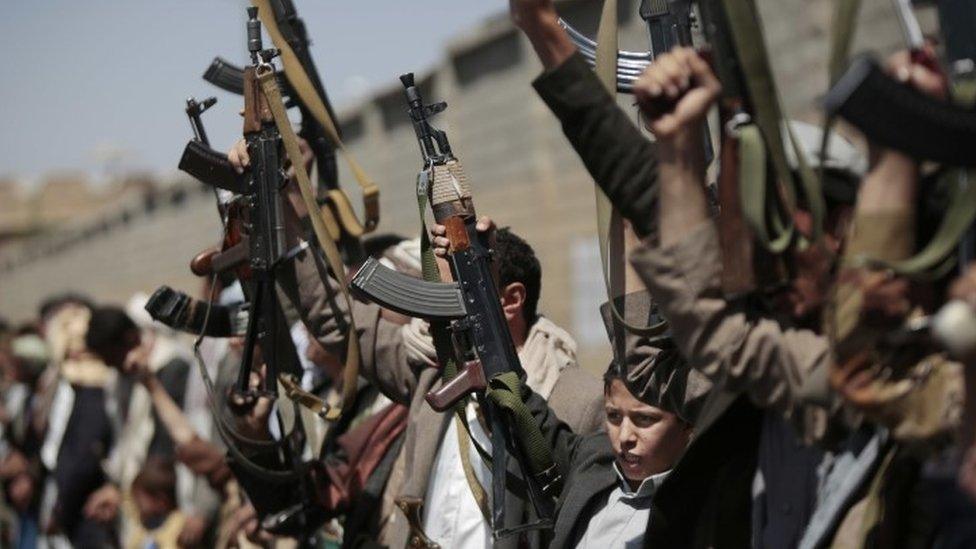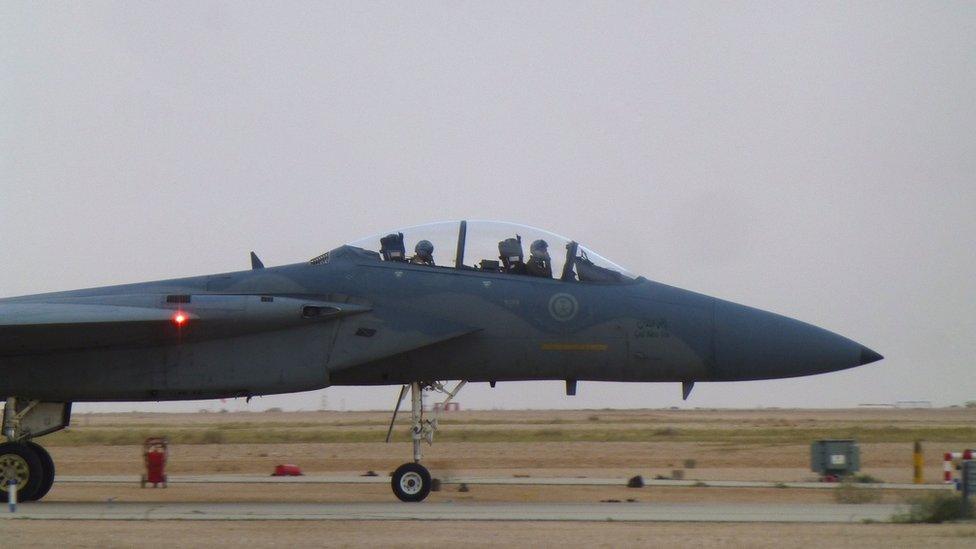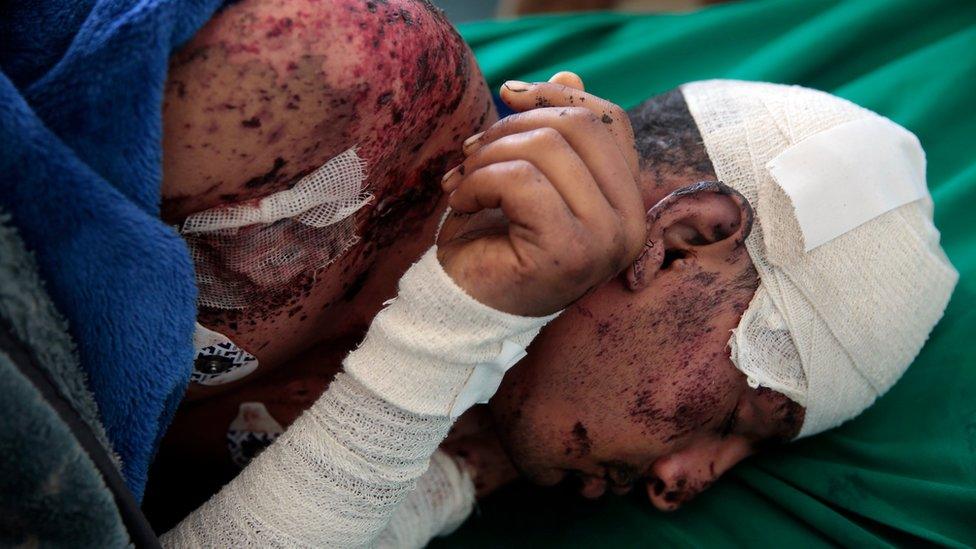Saudi Arabia rejects responsibility for Yemen's woes
- Published

Houthis have remained stubbornly in control of the capital and most of the more populous, western half of Yemen
The Iran-backed Houthi rebels who seized power in Yemen two years ago are refusing to vacate the cities as part of a proposed peace deal, according to senior Saudi officials.
The Houthis have fired more than 30 ballistic missiles across the border into residential areas of Saudi Arabia and have imprisoned and tortured their own citizens.
These, and other allegations of Houthi misdeeds, are part of a determined public relations effort by the Saudis this week to confront the growing condemnation of their role in Yemen's civil war.
Air strikes conducted by the Saudi-led coalition, in support of the UN-recognised Yemeni government, have been blamed for the majority of the estimated 10,000 deaths so far.
Saudi Arabia's Maj Gen Ahmed Al-Assiri: "We have to find a political solution"
One particularly devastating air strike on 8 October hit a packed funeral hall in the capital Sanaa, killing 140 people and injuring hundreds more.
An investigation by the Saudi-led coalition concluded the attack had been carried out in error, that normal safety procedures had broken down and that individuals involved had since been removed from their posts.
But it follows a number of reported strikes on hospitals, industrial plants, a prison and other non-military sites that have led to calls by human rights organisations for an immediate arms boycott on Saudi Arabia.
The Saudis insist that they never deliberately target civilians, that rigorous checks and balances are imposed by their Coalition Air Operations Centre (Caoc) at King Salman Airbase in Riyadh, and that they abide by the international rules laid down in the Law of Armed Conflict (Loac).

Read more:

To put their side of the story forward, the Saudis have sent their top coalition Spokesman, Maj Gen Ahmed Al-Assiri to London, accompanied by a senior Yemeni foreign ministry official and a representative from the King Salman Humanitarian Aid and Relief effort.
In an interview with BBC News Gen Al-Assiri was at pains to point out that:
Saudi Arabia and its allies did not start the war in March 2015. It began six months earlier in September 2014 when the Houthis marched on the capital and occupied it, arrested ministers, dismantled parliament, imprisoned the president and then attacked his villa with a MiG-29 jet
Saudi Arabia and 10 other countries responded to a request for help by the UN-recognised Yemeni government by launching Operation Decisive Storm with the air campaign on 26 March 2015
The Saudi-led coalition does not oppose the Houthis being in government. But it needs them to transform from an armed militia to a political party. Saudi Arabia "will not tolerate an armed militia on its borders, backed by a foreign power" (Iran)
The Houthis have access to a stockpile of up to 300 ballistic Scud missiles, 36 of which have been intercepted by Saudi Patriot batteries after being launched into Saudi airspace. The most recent one landed near Mecca
The Houthis must hand back the weaponry they "stole" from Yemeni government armouries. They have "hijacked the country and are killing people every day in the streets"
If the UN-recognised Yemeni government no longer needs the support of the Saudi-led coalition then "we will stop"
Saudi Arabia will not allow Yemen to deteriorate into "a failed state like Libya"
The coalition cannot achieve its political goals without first degrading the Houthi militias' capabilities on the ground
What the Saudi-led coalition is doing in Yemen - trying to liberate the population that has been taken over - is no different from what the US-led coalition is doing in Raqqa or the Iraqi government in Mosul
The general's words very much reflect the way the Saudi leadership views the Yemen conflict.
Gen Al-Assiri is also military adviser to the driving force behind the Saudi-led coalition, the Saudi Defence Minister and Deputy Crown Prince Mohammed Bin Salman Al-Saud - who could quite possibly be the the next King.

The Saudi-led coalition has been carrying out air strikes since March 2015

More than 500 people were injured when an airstrike hit a packed funeral hall in the capital Sanaa in October
The Saudis see themselves as being surrounded on almost all sides by Iran and its proxies - in Lebanon, Syria, Iraq, Iran, the Gulf and now Yemen.
When they put together their coalition in March 2015 and began the air campaign, there was an expectation that their air superiority and 21st-century US and UK-supplied weapons would soon force the Houthis to sue for peace at the negotiating table.
But the Houthis have remained stubbornly in control of the capital and most of the more populous, western half of Yemen. Peace talks have dragged on for months, in Oman and then Kuwait, with no result.
Meanwhile the airstrikes continue, against a growing clamour in both northern Yemen and in the UK.
The UN estimates that 80% of Yemen's population is now in need of humanitarian aid. There are warnings the country could be on the verge of famine.
The war is a stalemate and unless both sides can accept the latest peace proposals there is little sign of it ending soon.